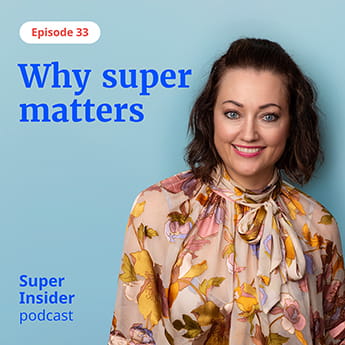How regular super contributions can compound your earnings
28 February 2025
2
min read
Ever wondered how a little extra money in your super today could make a big difference tomorrow? It's all thanks to the snowball effect of compound earnings.

|
How super can make saving for retirement less stressful
In this Super Insider episode, Anne Fuchs chats with Misha Schubert, the CEO of the Super Members Council (SMC), about how super has completely changed retirement for Australians.
Listen Now
|
 |
What are compound earnings?
Compound earnings start small but grow bigger over time. In super terms, it's when you earn investment returns not just on your initial amount, but also on the returns you've already earned.
Some people might describe it as earning interest on interest. We like to think about it as a snowball effect of compounding earnings.
The main difference between super returns and bank interest is that your super investments might grow faster when the market is doing well. This is because, as well as earnings, the value of your investment can go up. But the value of your investment can also go down if the market isn't doing well.
Returns are what you earn on your investments, and they can go up or down.
Compound earnings are when your investments earn money on past returns.
Generally, here's how compound earnings work:
- You put money into your super.
- That money earns a return and that return is added to your super balance.
- If the market goes up, you could earn returns on that bigger balance every day.
- This cycle continues year after year, which could grow your super balance.
Tip: At ART we use unit prices to track investments. Investment performance is reflected in the movement of unit prices. Compounding returns will be reflected in changing unit prices. Past performance isn't a reliable indicator of future performance.
See how much extra you could have in retirement
Use our contributions calculator to get a more accurate look at how much you could be better off with regular voluntary contributions to your super
Try the calculator
Do my investment options affect compound earnings?
Yes, your investment options can affect your compound earnings. That's because your super’s earnings are different from a bank account. They depend on how your money is invested, not a fixed interest rate.
Different investment options come with different levels of risk and potential returns. Generally, higher-risk options aim for higher long-term returns, which could mean more compound earnings over time. But remember, they can also experience more ups and downs along the way.
Lower-risk options might have more stable returns but potentially lower long-term growth. It's all about finding the right balance for your situation and comfort level.
Tip: Your returns go up and down over time. Choose your investment to suit your timeframe.
Case study example: Lee
See the snowball effect of compounding earnings in action.
Meet Lee1, age 30. They earn $80,000 a year and currently have $50,000 in their super.
Let's look at two scenarios:
- Lee sticks with their employer's 12.75% super contributions
Assuming a 6.5% annual return (after fees and taxes), Lee’s super could be $648,225 at age 67.
- Lee adds an extra 1% of their salary as a voluntary (after tax) contribution.
Assuming a 6.5% annual return (after fees and taxes), here's how Lee’s super could be $696,563 at age 67.
That's an extra $48,338 in Lee's pocket at retirement – all from contributing just 1% more of their salary each year.
This example is provided for illustrative and educational purposes only and the member shown is not real. The calculations are not intended to be relied on for the purposes of making a decision in relation to a financial product. You should seek advice from a qualified licensed professional, regarding your own circumstances, before making any financial decisions.
The results are shown in today’s dollars with inflation set at 3.7% p.a. Lee's salary income has been indexed at 3.7% with current employer super contributions of 12.75% p.a. Current superannuation and taxation legislation has been applied and is subject to change. Assumed rate of return is 6.5% based on the High (Growth) Investment strategy (after investment fees, costs and taxes but before product administration fees and insurance costs).
Do you have an account with us?
You can choose to invest your super in our investment options, or leave it to us to invest for you.
If you leave it to us, we'll invest it in the Lifetime Investment Strategy.
Compounding earnings can play a big role in growing your super balance over the long term.
Regularly review how your super's invested. Check the QSuper Investment Guide (PDF) to make sure your investments match your goals and timeframe.2
Need some help? You can get advice about your QSuper account online or over the phone.
It's included as part of your membership.3
The information on this page is provided for general information purposes only. It's not to be relied on for the purposes of making a decision in relation to a financial product, and it's not a substitute for professional advice. Before making a decision, you should consider getting advice from a financial adviser.
1. Lee is not a real member. This case study has been provided for illustrative purposes and uses general information only. It's not based on your personal objectives, financial situation or needs. Consider your own situation and goals to decide what's right for you. Additionally, figures may be rounded for ease of understanding. Past performance isn't a reliable indicator of future performance. Investment returns can be positive or negative and this does not guarantee a future outcome. The total saved does not take inflation into account.
2. Each investment option has a different performance objective, risk profile, asset allocation and investment style which may also change from time to time. Each of these features may be significant in respect of the investment return for any option. For full details of each option, read the PDS that applies to you. For details of the fees and costs that apply to each option, see our Fees page. for Accumulation accounts refer to the QSuper Accumulation Guide and for Income accounts refer to the QSuper Product Disclosure Statement for Income Account and Lifetime Pension.
3. QInvest Limited (ABN 35 063 511 580, AFSL 238274) is a separate legal entity responsible for the financial services it provides. Eligibility conditions apply. Refer to the Financial Services Guide (pdf) for more information.